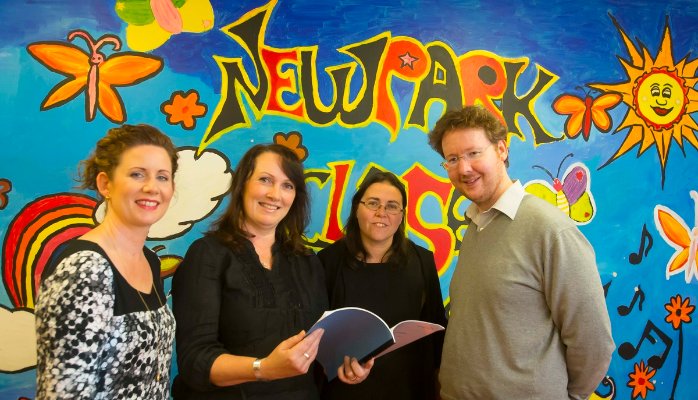Waterford Institute of Technology & ARC Mediation’s Family Justice Mediation pilot, now in its third phase, gives parents control over processes and outcomes as well as making legally-binding agreements during the mediation process
[From left to right; Laura La’Brooy (pilot administrator), Dr. Roisin O’Shea (partner, ARC Mediation), Dr. Sinead Conneely (pilot coordinator), Shane Dempsey (partner, ARC Mediation)]
A new way of doing family mediation which aims to reduce the long family law lists in the District Courts, has shown a high amount of positive outcomes.
To date 95% of cases in the Waterford Institute of Technology Family Justice Mediation pilot have reached agreement – mostly around parenting access or maintenance. In 70% of those cases agreement was reached on all issues.
The aim of the programme is to reduce the long family law lists in the District Courts, where up to 90 cases a day are regularly listed for hearings, and reduce stress and costs currently associated with family law proceedings.
The third and final phase of this innovative pilot family mediation service, which is a research initiative of Waterford Institute of Technology in partnering with ARC Mediation, is now being launched. It is available to families in the South East region from this month until July 2016.
The process was developed by Dr Roisin O’Shea during her PhD research at Waterford Institute of Technology which was funded by the Irish Research Council. Dr O’Shea created a programme with the best elements of family mediation she observed internationally during her research, and she added a few innovations.
Dr O’ Shea, Project Principal Investigator, explains that through the mediation project parents can deal with all issues including Guardianship, Custody, Access and Maintenance.
“All of the pilot cases had parenting issues, with 80% of non-resident parents having no parenting time with their child or children pre-mediation. We have specialist mediators who are skilled in dealing with conflict between parents and can assist the parents to make parenting arrangements that will work for them and their children. Why have a Judge who is a stranger to your child or children decide those arrangements in a few minutes in a courtroom? In our project the focus is on problem solving, with the parents having control over the process and outcomes.”
“One of main differences between regular family mediation processes in Ireland and the new process being piloted, includes having two mediators, one of each gender, to avoid feelings of gender bias. Other differences include time management, solicitors are included in the process, and legally-binding agreements are made during the mediation process itself,” adds Dr O’Shea.
The Waterford Institute of Technology Family Justice Mediation pilot has already attracted international attention. Dr O’ Shea and Kathy Irwin (Partner in Beauchamps, Dublin) were invited to present at the Association of Family and Conciliation Courts (AFCC) annual conference in New Orleans in May 2015. Dr O’ Shea and WIT law lecturer Dr Sinead Conneely who completed ‘Family Mediation in Ireland’ PhD research and heads up the project have also been invited to present on the pilot at the International Shared Parenting Conference in Bonn in December.
In speaking of the support for the project Dr Sinead Conneely commented
“We have had incredible support for this project, both from solicitors who have encouraged their clients to adjourn their case and attend mediation, and from Sheila Donnelly and staff at the Newpark Close Family Resource Centre in Kilkenny.”
Anyone interested in accessing mediation in the pilot should contact ARC.

